Everything You Need to Know About COBRA Administration
See How We're Different
or call us: (858) 384‑1506
COBRA stands for the Consolidated Omnibus Budget Reconciliation Act. This federal law allows individuals to extend employer-sponsored healthcare coverage for specific events temporarily. For example, employees who leave their position may pay their insurance premiums themselves to continue coverage even after their job ends.
The COBRA process can be complicated despite this being a common business requirement.
Why do some employers choose to outsource COBRA administration?
The law is complex, with severe consequences for missed deadlines, mistakes, or violations.
It can also be expensive. The Internal Revenue Service (IRS) and the Department of Labor (DOL) both oversee the process and can both levy fines. Fines can reach $110 daily for failing to issue notices or missing deadlines. In some cases, individuals also have the power to sue employers for COBRA mistakes.
COBRA administration is also time-consuming. The hours of training required to do it correctly and the time needed to carry it out can be overwhelming.
Who does COBRA apply to?
It typically applies to employers with 20 or more employees. However, if the number of employees fluctuates throughout the year or an employer has many part-time employees, this number can be more challenging to define.
If your company is subject to COBRA, what is required?
You must correctly administer notices, payment deadlines, late payments, partial payments, coverage period updates, changes to plan options, address changes, coverage terminations, and more.
What should I look for when choosing a Third Party Administrator (TPA)?
- Compliance Expertise: Your TPA should have extensive knowledge of the federal guidelines and regulations for the COBRA administration process.
- Use of Technology: Your TPA should use a secure and efficient system that helps them handle on-time electronic delivery of required notices and letters.
- Customer Service: Choose an organization recommended for its customer service abilities. You want to ensure employees find this process as easy and comfortable as possible.
- Legal Accountability: Although a TPA will never be able to take on all legal risks of COBRA administration, the contract should stipulate that the TPA is financially responsible if it makes a mistake.
- Payment Schedule: For most TPAs, you can pay a fee for each qualifying event or a monthly fee per eligible employee. Based on your company’s turnover rate, you should ensure they offer your preferred option.
For most businesses, a TPA administrator is an excellent investment. In the long term, it can save your company hours and provide you peace of mind, knowing that each detail is taken care of.
At FOA, we have a proven track record of reliable and accurate compliance service across various industries. We can connect you with COBRA administration services that will make things easy, save you time, and allow you to feel confident knowing all the details are taken care of.
Click HERE to request more information!
Source: Zywave (COBRA Administration Outsourcing)







